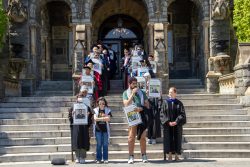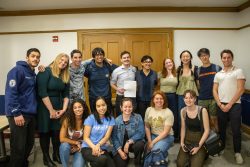Following its tradition of fostering competition to enact social change, Georgetown University is offering an incentive of $5 million to the community with the best plan to reduce energy consumption.
The Program on Science in the Public Interest launched the Georgetown University Energy Prize on April 23 with support from Georgetown University Environment Initiative and the McDonough School of Business Global Social Enterprise Initiative.
“The Georgetown University Energy Prize fits in nicely with the focus of the Social Enterprise Initiative,” Ladan Manteghi, Executive Director of GSEI, said because it is concerned with “global health and well-being, responsible investing, economic growth, international development, and clean energy.”
According to Georgetown Professor Francis Slakey, Executive Director of the Energy Prize, the prize money comes from various sponsors and partners, including the American Gas Foundation and the Joyce Foundation.
Kathryn Clay, executive director of AGF, explained that AGF is partnering with GUEP because AGF makes money based on providing access to gas, not based on quantity of gas sold.
The nationwide competition is open to all communities with populations between 5,000 and 250,000. “The biggest cities in the country already have established programs for energy efficiency,” Slakey said. “We wanted to target smaller communities, but 70 percent of the country lives in the size range we’re working with.”
Competing communities are required to create a long-term plan to increase energy efficiency and sustainability over the two-year duration of the competition. According to Slakey, success will be measured by “the total amount of electricity and natural gas delivered by the utilities to the residential and municipal customers.”
After two years, the top performers compete in a final round, which is judged with additional criteria, including how replicable the plan is and how successfully it engaged their community.
Prior to the program’s launch, there were already 51 communities across the country signed up to compete. “What prizes have done for centuries is uncover a novel approach to solving the problem,” Slakey said.
According to him, only approximately 5 percent of the public is actively engaged in increasing sustainability. “We are hoping that the prize will help us blow through that barrier and get more community engagement in energy efficiency.”





